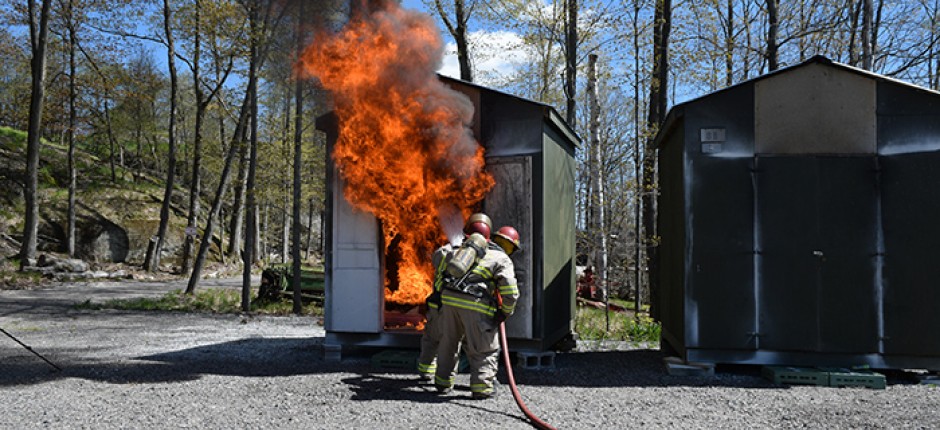By Jennifer Bieman
2017 Greg Clark Award Recipient
London, Ont.

Most working journalists have written it under the pressure of a deadline; “The fire marshal has been called in to investigate.”
But that last line in so many news stories is really only just the beginning.
The Office of the Ontario Fire Marshal (OFM) does its work behind the yellow police tape, probing the province’s most serious blazes – about 600 each year in all corners of the province.
Its investigators aren’t always available to talk to the press; they swoop in, scour the scene and can be gone the next day. Final reports can take weeks or months to complete, the details they uncover are used in criminal cases, by insurance companies or by governments wanting to change legislation.
The Greg Clark Award stipend allowed me to take a closer look at a process I’d mentioned in so many breaking news articles but never fully grasped myself.
It helped me understand exactly what “The fire marshal has been called in to investigate” actually means – for fire victims and public policy.
I travelled to the Ontario Fire College in Gravenhurst to spend the day with three of the OFM’s 18 highly-trained investigators. I learned exactly how fire investigations unfolded. I sat down with them to talk about their professional lives, the cases that have stuck with them and what the public should know about the work they do.
I went to the OFM’s lab northwest of Barrie and met four of the agency’s engineers, specialists called into help investigators probe gas or electrical fires. If a home appliance sparks a fire, the engineers are there to figure out how it happened and pass their findings on to other ministries, provinces or product safety regulators.

I learned just how different Ontario’s fire investigation system is from other provinces like Alberta. During a trip to Edmonton to meet with the province’s acting fire commissioner, I saw how the government gives investigative authority to trained professionals on municipal departments.
But whatever the investigative model, both agencies’ findings contribute to nationwide discussions about public safety, facilitated by the Canadian Council of Fire Marshals and Fire Commissioners.
For reporters, getting the gritty details about a fire from investigators can be difficult, frustrating even.
Fire investigators produce detailed reports on every fire they go to, an analysis that can take weeks or months to finalize. They attend post-mortems of people killed in fires, they travel long distances to attend scenes, they call in experts, interview witnesses and test items pulled from burned out buildings.
So when journalists dial up the OFM office hours after a fire broke out, its investigators aren’t always able to comment. They don’t want to take a premature guess about what caused the fire or divulge sensitive information.
Meeting with the investigative agencies in both provinces helped me understand why instant answers aren’t always possible. Thanks to the Canadian Journalism Foundation, I understand the process more than I ever did before and will be able to explain these behind-the-scenes details in the fires I cover.
That standard closing line slapped on so many fire stories has more meaning to me now. I also have a new appreciation for the challenges the agencies face, especially when fires break out in Indigenous communities. Neither Alberta’s Office of the Fire Commissioner or the OFM have the jurisdiction to probe those blazes and need to be personally invited by the band; a relationship both agencies want to focus on in the future.
There’s also a push to coordinate data sharing between provincial fire investigations agencies, or at least connect the people responsible for developing fire codes in each jurisdiction.
In the three years I’ve been reporting in Southwestern Ontario, I’ve been on scene for more fires than I can count; a blaze at a vegetable processing plant, a fire at strip mall and a single-family home that burnt to the ground with a father and his four young children inside.
At each one, the OFM was there.
Now I know who the investigators are, what they’re looking for and how what they discover can change laws and prevent more fires from happening.
I’m grateful the Canadian Journalism Foundation helped me find out.
Read Jennifer Bieman’s series in the London Free Press:
– ‘Inside The Fire, Part One: Ontario fire investigators fight for safety, not credit‘
– ‘Inside The Fire, Part Two: First Nations fire marshal in the works‘
To read more about the Greg Clark Award, visit the award page.
The Canadian Journalism Foundation would like to thank the following for for their generous support of the 2017 Greg Clark Award:
![]()
![]()



